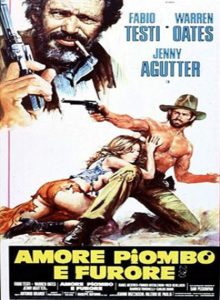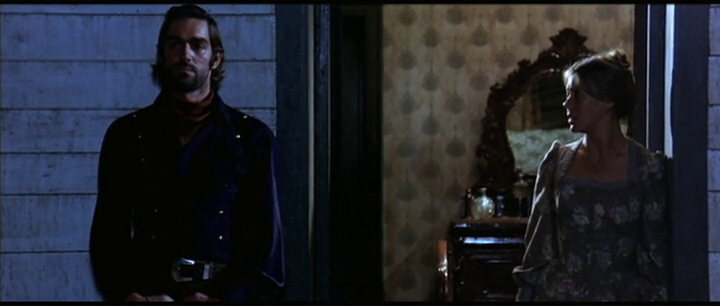China 9, Liberty 37 (1978)
 Hello, CMBA members! I’m happy to be participating in the Classic Movie Blog Association’s Fall “Outlaws” blogathon. If you’re new to my site, please click here to read more. Welcome!
Hello, CMBA members! I’m happy to be participating in the Classic Movie Blog Association’s Fall “Outlaws” blogathon. If you’re new to my site, please click here to read more. Welcome!
“I am a gunfighter; you are a woman between husbands.”
|
Synopsis: |
|
Genres, Themes, Actors, and Directors:
Response to Peary’s Review: I selected this western for inclusion in CMBA’s Fall Outlaws Blogathon because of the unusual shifting of who, exactly, the “outlaws” are as the film progresses. While hired-man Testi is the obvious first candidate, the railroad company requesting Oates’s murder is implicated as well: “outlaws” in this western landscape are clearly operating within a powerful web of industrial corruption. [SPOILERS ALERT] Once Oates discover’s Agutter’s affair with Testi and turns violent, Agutter believes she’s killed him in self-defense, and becomes an outlaw alongside her lover. However, when one of Oates’s brothers (Paco Benlloch) runs into the pair and learns what happened to Oates, he is naturally perturbed, and becomes involved in a prolonged kerfuffle that results in his death. When his corpse is delivered to the recovering Oates’s homestead, the plot has thickened considerably: Oates is now out to avenge not only his wife’s infidelity but the killing of his brother. With Agutter clearly penitent (one scene shows her mourning in a church), and honorable Testi returning the money he’s been given for killing Oates — he believes Oates’s “murder” was actually committed by Agutter — it becomes even more difficult to sort out who the “outlaws” actually are here. Meanwhile, another of Oates’s brothers (Gianrico Tondinelli) attempts to rape Agutter, but is stopped by Oates himself, who nonetheless says, “Go ahead, boy; that’s what whores are for”. Soon the original baddies — men representing the railroad company — set out to kill both Testi (who has not lived up to his agreement) and Oates (who they still want murdered). Testi’s life is saved by a prostitute-with-a-heart-of-gold (and a convenient penchant for sharpshooting), and he’s ultimately able to protect Oates from the killers who have amassed on his property and are waiting to ambush him. Testi’s final showdown with Oates — and the evolving relationship between Oates and Agutter, who appear to be trying to better understand one another and start afresh — is testament to the film’s refusal to categorize individuals (or “outlaws”) as either good or bad; humanity is far more complex than that. Redeeming Qualities and Moments: Must See? Links: |




One thought on “China 9, Liberty 37 (1978)”
Agreed, not must-see – but it’s a once-must for confirmed western fans.
Westerns make up a very high percentage of American filmmaking. Of these hundreds and hundreds and hundreds (maybe more) of films, some rise above the genre to a degree that they become must-sees for film fanatics in general.
Some of these would be Ford’s ‘Stagecoach’, Leone’s ‘Once Upon a Time in the West,’ some of the films by Mann and Boetticher and others. (I either already have or will point out such titles elsewhere at this site.)
Then there are westerns like ‘China 9, Liberty 37’ – which is a perfectly fine film (esp. considering its low budget) but more for those western lovers who stick to a steady diet of them.